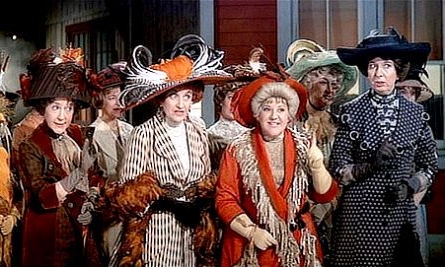"Someone in a Tree" - When It's All About Perspective
Okay - today was supposed to be "Guilty Pleasure Thursday" but a reader put this song in my mind earier this week and I haven't been able to shake it. I hope my readers don't mind if I put "Guilty Pleasures" off until Friday. Truthfully, the holiday weekend threw me off and I had already written this for what I thought was Wednesday. I suppose I shall have to break down and buy a calendar. Please be so kind as to humor me.
I think we all agree that Stephen Sondheim was sent to us from the heavens so we could look at musical theatre in a different way, as well as argue about which of his shows are the best . Within his labyrinthine lyrics he offers deft perception of the human mind, as well as unparalleled perspectives on the world those humans see. Sondheim is, perhaps, never more adept at achieving unique perspective than in "Someone in a Tree" from Pacific Overtures (1976).
The musical was short-lived, running a mere 193 performances. It was an artful telling of the Westernization of Japan, employing conventions of Kabuki Theatre, the pentatonic scale (a reasonable facsimile of), haiku, and other conventions of the traditional Japanese culture. Even for Sondheim fanatics, Pacific Overtures is an esoteric title among the theatre cognoscenti. Why? The show is rarely done, and, when it is, it is seldom done well. Many let it hide in the shadow of Sweeney Todd, Into the Woods, and Company, neglecting its subtle luster for showier fare.
"Someone in a Tree" is a study of history and how it is perceived initially and interpeted over time. When Commodore Perry and his men meet with Japanese officials to devise a treaty that will open up the isolationist Japan for trading purposes, history plays out. Instead of showing us the drama unfolding inside the treaty house, Sondheim chooses to start the song from the point of view of an old man remembering how he watched the meeting from a tree outside the treaty house. Soon, his younger self, a ten-year-old boy, leaps into the tree and the two sing with each other, arguing about the details of the story. Time and embellishment have made the old man's story inconsistent with what the boy observes, and he in turn has a very naive view of what is happening. Age, experience, knowledge and hindsight color and shade how we see events and remember them. As if this weren't fascinating enough, a warrior appears from under the treaty house and relates his perspective, only able to hear what is going on. Can the boy assess the situation clearly without audio context? Can the warrior make accurate inferences without visual cues? The story becomes more fleshed out for the audience, but each storyteller is contradicting the other two in the trio because they don't have all the information. There is a side to every story, and no version is the complete or succinct telling. History is not just facts. History is perspective.
Another theme that threads in and out of the fabric of "Someone in a Tree" is the palpable need embedded in all of us to be a part of history, to feel that we are in some way more involved in important moments than we, in reality, are. Sondheim addresses this same compulsion to lesser effect in "How I Saved Roosevelt" from Assassins (1991). The characters want to think that, if they hadn't been there, the outcome may not have been the same. "Someone in a Tree", in its catchy refrain, then manages to telescope out and remind us that this moment is only one small grain of sand in the great scheme of things. "Not the building, but the beam. Not the garden but the stone." It is Sondheim's abilty to offer so many perspectives in one song and have them all coincide within the realm of plausible fact that make this song one of the most compelling, complex, and insightful pieces ever written for the musical theatre.
Or is that just my perspective?






